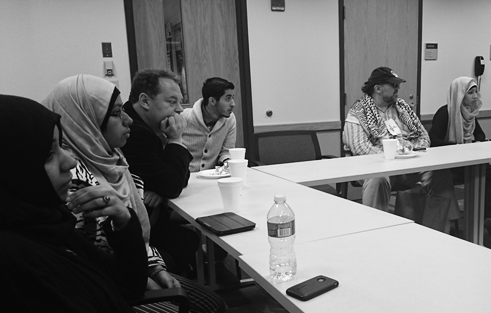By Elaf Suliman
Editor’s note: The writer of this article is a member of the Students for Justice in Palestine. This is her opinion of the issues presented at the event.
Suffolk University’s Students for Justice in Palestine are bringing forward the information that the public may not be informed with. The on-campus club held their first event of the semester Nov. 5, as they aired the award-winning film documentary, “5 Broken Cameras.” The club served falafel sandwiches from Falafel King during a question-and-answer session, where people stayed after the movie to talk about the current reality in Palestine.
According to PBS, “5 Broken Cameras” is a deeply personal first-hand account of life and nonviolent resistance in Bil’in, a West Bank village where Israel is building a security fence. Palestinian farmer Emad Burnat, who bought his first camera in 2005 to record the birth of his youngest son, shot the movie. Israeli filmmaker Guy Davidi co-directed. The lifespan of each camera captures the struggle of the Palestinian village of Bil’in, joined by activists from Israel and elsewhere against expanding Israeli settlements and the path of the country’s approaching security fence, which together would consume much of the village’s cultivated land. The cameras also capture the growing awareness and puzzlement of Gibreel into a world torn by a conflict that adults can barely comprehend.
Yasmeen Hamdoun, President of the SJP gave a small speech to the crowd before the film began. She reminded the audience of the club’s previous past events and welcomed the guests to food and refreshments. In the past, SJP featured an Anthony Bourdain documentary which focused on cultural aspects of Palestine. The club also featured “Occupation 101,” a documentary that voiced the silenced majority and focused on the history of the conflict. During this event, the American author, journalist and blogger Max Blumenthal came in to speak about his new book “Goliath: Life and Loathing in Greater Israel.”

After the event Hamdoun said “I think the one beneficial thing the documentary managed to do was to humanize the Palestinians. You turn on the TV and all you see are Muslims and Arabs being associated with terrorism. After a while, people start to forget that they are human beings with feelings, that they are just normal people who want to live free and eat from the olive trees that grow on their stolen land, that like the Palestinians themselves, continue to stand strong despite being constantly attacked by their Israeli occupiers.”
More than 30 people attended the movie screening at the Donahue building; the purpose of the film was not to debate the history of the Israel-Palestine conflict, but to show how Burnat experienced this uprising conflict in his village and how the people protested and demonstrated until the Israeli defense took down the fence. Although the majority of people who watched the movie left once it finished, 14 people stayed to discuss the current situation and gave suggestions of what needs to be done by Americans and the Arab States for Palestinians to live peacefully. As reported by Blumenthal, Israel continues to use propaganda to conceal its petty violence, shocking acts of humiliation and repression that define its treatment of the Palestinians.
As stated in Al Jazeera, Sweden’s Prime Minister Stefan Loefven said in early October that he believed peace hinged on establishing two states.
“A two-state solution requires mutual recognition and a will to coexist peacefully. Therefore, Sweden will recognize the state of Palestine,” he said to Al Jazeera. Sweden voted in favor of the Palestinians obtaining observer status at the U.N. in 2012, which was granted despite opposition from the U.S., Israel and other countries.
Professor Matteo Casini attended the SJP event and said, “We cannot blame the Palestinians, they don’t have big resources, they can only resist on the territory. And is already a miracle if this documentary arrived at the academy awards.” In agreement with history Professor Casini, Vice President of SJP Laila Sadeddin explained her country’s position.
“People tell us to revolt and to always resist and fight back, but when we do, either violently or nonviolently, we’re always backlashed. Whatever we do is never good enough for anybody,” she said.
Palestinians in the West Bank and Gaza Strip live under Israeli military occupation. As reported by If Americans knew, Israel routinely violates the Geneva Conventions which gives the guidelines of international law for the humanitarian treatment of war. It was adopted in 1949 after World War II.





